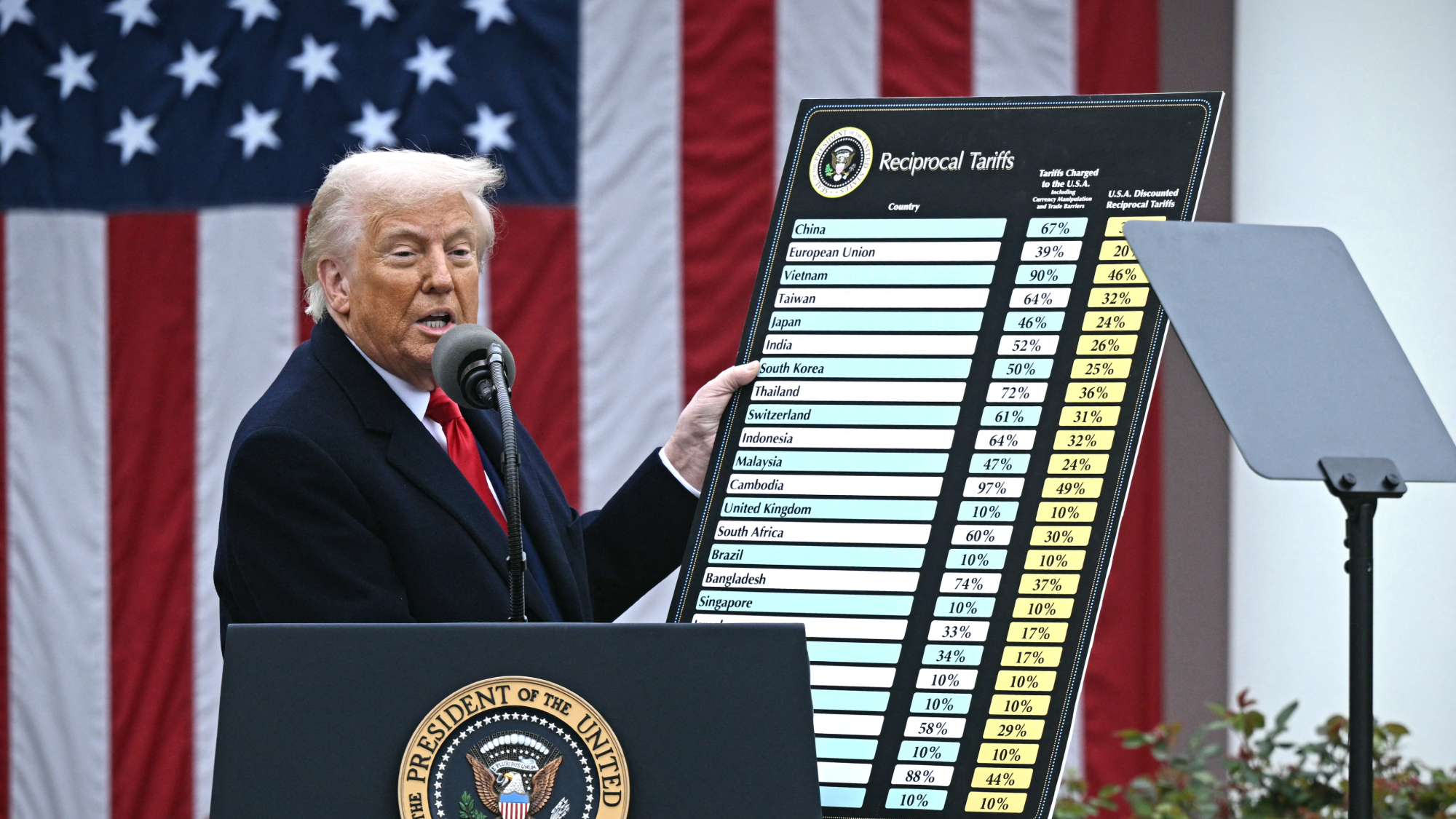Tariffs: Will Trump’s reversal lower prices?
Retailers may not pass on the savings from tariff reductions to consumers

A free daily email with the biggest news stories of the day – and the best features from TheWeek.com
You are now subscribed
Your newsletter sign-up was successful
President Trump ran in 2024 on the promise that he’d tame prices. Now he has “finally admitted his tariffs do the opposite,” said Schuyler Mitchell in Mother Jones. Scrambling to tackle the affordability crisis that drove voters to Democrats in this month’s elections, Trump announced that he was exempting more than 200 agricultural imports—including staples like beef, coffee, and bananas—from the reciprocal tariffs he “proudly implemented in April.” Those import tolls, which range from 10% to 50%, have helped push up the price of numerous groceries: Coffee is up 19% over the past year and beef 16%. Of course, Trump didn’t concede outright that his signature policy is stoking sticker shock, and his administration continues to insist that foreign companies, not American consumers, pay tariffs. “But if tariffs had no impact on consumer prices, then Trump would not now find the need to roll them back.”
While tariffs do raise prices, this reversal “probably won’t make your life more affordable,” said Elisabeth Buchwald in CNN.com. That’s partly because many of the goods on Trump’s list are subject to his other tariffs. In July, for example, he slapped an extra 40% duty on Brazil—the world’s top producer of coffee beans—over the trial of his ally, former Brazilian president Jair Bolsonaro. That tariff remains in place. Then there’s the fact that retailers may not pass on the savings from tariff reductions to consumers and could instead use them to pad their bottom line or cover other costs. But even “a limited, begrudging retreat from a foolish, expensive policy is still a step in the right direction,” said Eric Boehm in Reason. And perhaps Trump will now ponder this question: “If reducing tariffs provides relief to consumers who eat bananas and drink coffee, what would removing other tariffs do for American manufacturing?”
If he’s lucky, the Supreme Court will step in and “save Trump from himself,” said Eric Levitz in Vox. The justices heard arguments earlier this month over the president’s power to unilaterally impose tariffs and a majority appeared primed to rule against Trump. He might even “welcome an excuse to scale back his self-sabotage”—his net approval on inflation is now 33 percentage points underwater, down from plus 5 points after his inauguration. A repeal of Trump’s tariffs would lift the average household’s annual income by more than $1,000. That would be a meaningful victory for affordability, at least until Trump finds a new rationale for “deliberately driving up the cost of living.”
A free daily email with the biggest news stories of the day – and the best features from TheWeek.com
The Week
Escape your echo chamber. Get the facts behind the news, plus analysis from multiple perspectives.

Sign up for The Week's Free Newsletters
From our morning news briefing to a weekly Good News Newsletter, get the best of The Week delivered directly to your inbox.
From our morning news briefing to a weekly Good News Newsletter, get the best of The Week delivered directly to your inbox.
-
 Trump’s EPA kills legal basis for federal climate policy
Trump’s EPA kills legal basis for federal climate policySpeed Read The government’s authority to regulate several planet-warming pollutants has been repealed
-
 Political cartoons for February 13
Political cartoons for February 13Cartoons Friday's political cartoons include rank hypocrisy, name-dropping Trump, and EPA repeals
-
 Palantir's growing influence in the British state
Palantir's growing influence in the British stateThe Explainer Despite winning a £240m MoD contract, the tech company’s links to Peter Mandelson and the UK’s over-reliance on US tech have caused widespread concern
-
 Trump’s EPA kills legal basis for federal climate policy
Trump’s EPA kills legal basis for federal climate policySpeed Read The government’s authority to regulate several planet-warming pollutants has been repealed
-
 House votes to end Trump’s Canada tariffs
House votes to end Trump’s Canada tariffsSpeed Read Six Republicans joined with Democrats to repeal the president’s tariffs
-
 Bondi, Democrats clash over Epstein in hearing
Bondi, Democrats clash over Epstein in hearingSpeed Read Attorney General Pam Bondi ignored survivors of convicted sex offender Jeffrey Epstein and demanded that Democrats apologize to Trump
-
 Judge blocks Trump suit for Michigan voter rolls
Judge blocks Trump suit for Michigan voter rollsSpeed Read A Trump-appointed federal judge rejected the administration’s demand for voters’ personal data
-
 US to send 200 troops to Nigeria to train army
US to send 200 troops to Nigeria to train armySpeed Read Trump has accused the West African government of failing to protect Christians from terrorist attacks
-
 Grand jury rejects charging 6 Democrats for ‘orders’ video
Grand jury rejects charging 6 Democrats for ‘orders’ videoSpeed Read The jury refused to indict Democratic lawmakers for a video in which they urged military members to resist illegal orders
-
 Democrats push for ICE accountability
Democrats push for ICE accountabilityFeature U.S. citizens shot and violently detained by immigration agents testify at Capitol Hill hearing
-
 Fulton County: A dress rehearsal for election theft?
Fulton County: A dress rehearsal for election theft?Feature Director of National Intelligence Tulsi Gabbard is Trump's de facto ‘voter fraud’ czar